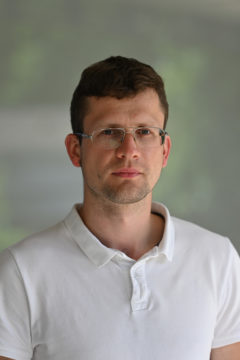Venue:
– Salle de visioconférence n°4 (Voir le plan d’accès)
– Sur zoom: https://u-bordeaux-fr.zoom.us/j/83299513595
 Thesis supervisor: Arthur Leblois
Thesis supervisor: Arthur Leblois
/ Team
Network dynamics for procedural learning
IMN
Title
Abstract
Title: Role of the cerebellum in avian song learning
Abstract:
The cerebellum is important for sensorimotor learning. This structure is involved in real-time correction of movement errors, coordination and temporal adjustment of motor actions. Coordination of muscles and plasticity of muscle activation time are important for the acquisition and production of speech. The difficulties of cerebellar patients for speech perception and production as well as the activation of the cerebellum during speech production suggest a role of the cerebellum in this behavior. An animal model for producing vocalizations is the songbird. These birds have a neural circuit dedicated to song production and learning. The song is learned in the juvenile stage and remains stable during adult life. This stability of singing requires the presence of undistorted auditory feedback. The song of deafened birds deteriorates sharply and the distortion of auditory feedback in healthy birds induces reversible changes in the temporal properties of song. The cerebellum is functionally connected to the song circuitry and plays a role in learning the temporal features of song in the juvenile stage. What would be the role of the cerebellum in the production of adult vocalizations? The cerebellum couId compare the expected auditory feedback to the actual auditory feedback during singing to update a possible internal model relating to singing. The cerebellum couId also participate in adjusting the duration of song elements.
For this, we study the modulation of the activity of the cerebellum during singing and look for motor and auditory representation of singing in the cerebellum. We recorded neural activity during singing with and without auditory distortion as well as during passive auditory stimulation. The distortion of auditory feedback during singing is done to unveil a possible representation of unexpected auditory feedback in the cerebellum. We also performed lesions of the cerebellar output structures to study the effect of the cerebellum on the plasticity of the temporal features of adult song.
We discovered that the neurons of lobule IV modulate their activity during song production but much less du ring passive song listening, suggesting a motor role of this lobule. Moreover, the modulation of lobule IV activity during singing is not affected by the distortion of auditory feedback. However, lobule V neurons modulate their activity du ring singing and du ring passive listening. Some of these neurons are modulated similarly du ring singing and during passive listening to song. The activity of this lobule is also modulated by the distorted auditory feedback, but these modulations can be explained by passive responses to auditory stimuli. This suggests a sensory role for this lobule. Finally, we found a correlation between neuronal activity and the duration of song elements, which suggests a role of the cerebellum in controlling the temporal features of song.
We also discovered that the plasticity of the duration of the song elements can be induced by the distortion of the amplitude of the song produced and/or by the time shift of the initiation of the song element. Finally, the lesion of the output structures of the lateral cerebellum does not affect the capacity to modify the duration of the elements of the song under the effect of distorted auditory feedback. Nor does the lesion significantly affect the dynamics of return to the initial durations.
Du ring this work, we found a motor and sensory representation of song in the cerebellum of songbirds. Our data doesn’t allow to assert that the lateral cerebellum is involved in the plasticity of sang elements. This work provides additional dues for a role of the cerebellum in the production of vocalizations.
Key words : Cerebellum, sensorimotor learning, electrophysiology
Jury
M. David DIGREGORIO: Président
Mme Daniela POPA: Rapporteure
M. Nicolas GIRET: Rapporteur
Mme Christelle ROCHEFORT: Examinatrice
Mme Annemie VAN DER LINDEN: Examinatrice

